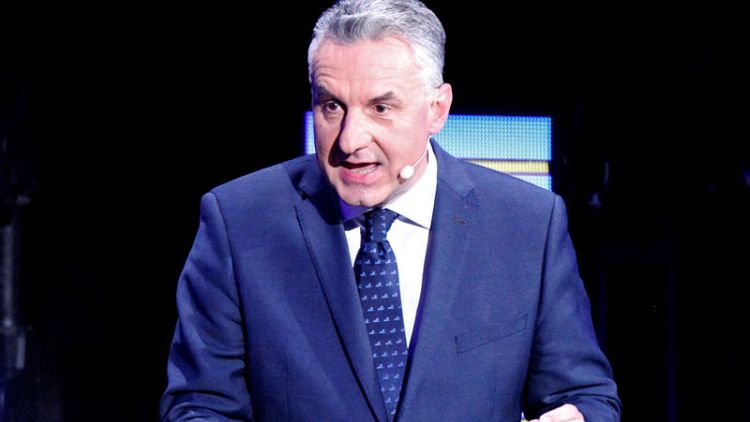By Alastair Macdonald and Alissa de Carbonnel
BRUSSELS (Reuters) - Raising corporate taxes and wages, cutting carbon emissions, handling African migrants and standing up to Russia, China and the United States all got an airing in Europe's "presidential debate" on Wednesday.
But though lead candidates from six pan-EU party groups running in next week's elections to the European Parliament gave polished and concise answers, their debate lacked the rising voices of nationalists who want to tear today's European Union down -- and, by all appearances, much of an actual audience.
Broadcasters in big member states relegated the 90 minutes of polite and only occasionally heated confrontation from the EU assembly's Brussels chamber to little watched or online channels and social media interactions were in the tens of thousands -- a fraction of the 427 million who can vote from May 23 to 26.
As its French, German and Finnish presenters struggled to communicate in English, there was no shortage of commentary online comparing the production unfavourably with the much mocked annual Eurovision Song Contest, also broadcast this week.
And if the EU's harsh critics like Italian Interior Minister Matteo Salvini or Brexit campaigner Nigel Farage took some stick from the podium, the closest the debate came to giving voice to eurosceptics who expect to gain seats was from Jan Zahradil, a Czech from a group led by Britain and Poland's ruling parties.
The title of "Presidential Debate" reflected a push by the European Parliament to have national leaders choose a candidate from a winning party to succeed Jean-Claude Juncker as president of the executive European Commission next month. But leaders such as French President Emmanuel Macron and German Chancellor Angela Merkel are reluctant to have their choice so restricted.
SHARP EXCHANGES
Polls show the centre-right likely to remain the biggest group and its lead candidate, German EU lawmaker Manfred Weber, used the opportunity to defend his party ally Juncker's record and to take digs at rivals to his left, notably the centre-left candidate, Juncker's Dutch deputy Frans Timmermans.
Seemingly wary of coming over as too cosy in the beleaguered centre ground of European politics, Weber and Timmermans sparred relentlessly.
The Dutch former foreign minister used his easy English, and French, to effect, while demonstratively staking out common ground with the three other candidates: German and Belgian EU lawmakers Ska Keller of the Greens and Nico Cue of the far-left, and Denmark's liberal EU commissioner, Margrethe Vestager.
None could be said to have landed a killer blow and few pundits will be poring over the contest as they would in a national leadership debate. Results next week will largely be determined by national factors. And national leaders may not take much account of the vote in naming a new EU executive.
With harsh critics of the European Union set to increase their share of the parliament by up to 50% to perhaps 15% of the chamber, the six all made pleas for Europeans to at least vote next week. More than half did not in 2014.
All pledged to reform -- in some way -- the existing Union, ranging from an end to euro zone austerity on the left to a return of powers to sovereign states on the right. But ahead of an election in which Britons may be taking part for the last time, all spoke out against the idea of breaking up the EU.
Paralysis in London, two months after Britain should have left, has led to the absurd spectacle of people voting for lawmakers who may barely take their seats. It was not a good model, candidates said, with Timmermans hitting hardest: "The United Kingdom looks like Game of Thrones on steroids."
For Weber, it was "time to defend the European idea against nationalists and egoists".
Voters will have their say from next Thursday to Sunday.
(Reporting by Alastair Macdonald; Editing by Tom Brown)
